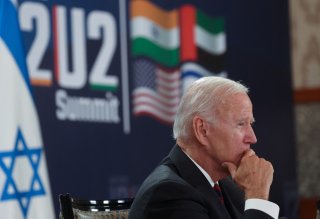Is This the Birth of the ‘West Asian Quad’?
India, Israel, the United States, and the United Arab Emirates have unveiled a new platform for regional cooperation as the Biden administration struggles to reassert American influence.
India, Israel, the United States, and the United Arab Emirates have unveiled a new platform for regional cooperation as the Biden administration struggles to reassert American influence at a time of acute crisis for the post-Cold War international order.
The first India-Israel-U.S.-UAE (I2U2) summit was hosted by Israel in virtual format on July 14. “This unique grouping of countries aims to harness the vibrancy of our societies and entrepreneurial spirit to tackle some of the greatest challenges confronting our world, with a particular focus on joint investments and new initiatives in water, energy, transportation, space, health, and food security,” read a joint statement by the four countries’ leaders. The statement highlighted a range of clean energy and food security projects, including a $2 billion UAE investment to develop “integrated food parks across India” and the creation of a hybrid renewable energy project in India’s northwestern Gujarat state. “We need to think in new terms when it comes to energy, food security, water tech, defense and trade,” said Israeli Prime Minister Yair Lapid.
The format is intended to reassure friends and allies of Washington’s continued strategic commitment to the Middle East in the aftermath of the chaotic withdrawal from Afghanistan—which some experts say dealt a blow to U.S. credibility in the eyes of key regional actors—and to foster multilateral ties between U.S. partners.
The summit is no small part a recognition of India’s growing economic and geopolitical stakes in West Asia. India’s unexpected participation ties into one of the summit’s overarching goals: checking China’s influence in parts of Asia and the Middle East. The I2U2 is, in this sense, a distant analogue to the Quad, a strategic partnership between Australia, India, Japan, and the United States that is intended to counter China in the Pacific.
But I2U2 falls short of being a “West Asian Quad” in one key respect: it is not based on the mutual recognition of a threat posed by one or more countries. In fact, the four members’ threat perceptions differ wildly. Whereas Washington is deeply invested in Ukraine’s victory over Russia, the I2U2’s remaining members all have maintained neutrality in the ongoing Ukraine war. Nor is I2U2 an effective format for concerted efforts to counter China, considering that both Israel and the UAE have staked out warm relations with Beijing.
The I2U2 platform’s symbolic message of unity is further belied by specific policy differences between its members, notably including those between the Biden administration and Jerusalem. With the Iran deal hanging on by a thread, President Joe Biden and Lapid starkly diverged in their messaging on Tehran’s nuclear capabilities. “If they [Iran] continue to develop their nuclear program, the free world will use force,” Lapid said during a news conference. Biden did not reiterate those comments or make any commitments to employ military force against Tehran, instead stressing the need for continued dialogue. “I continue to believe that diplomacy is the best way to achieve this outcome,” Biden said, referring to preventing Iran from acquiring nuclear weapons. “And we’ll continue to work with Israel to counter other threats from Iran throughout the region,” he added.
The I2U2 format appears to be driven by economic-developmental concerns in lieu of shared geopolitical and ideological aspirations. “I would like to emphasize: This is not a philanthropic group,” said Lapid. “We want to change the world for the better, but we are also creating relative advantages for our countries, for our businesses, for our science sector. In both projects that I mentioned, lists of local companies, relevant technologies have been already — have already been shared. Our goal is for the private market to be a full partner in this initiative.”
Biden traveled to Saudi Arabia on Friday to meet with Crown Prince Mohammed bin Salman. He is expected to ask the Saudis to boost oil production as U.S. consumers continue to grapple with record gas prices at home. Saudi Arabia and OPEC have consistently rejected earlier U.S. requests to boost output. French president Emmanuel Macron told Biden on the sidelines of the G7 summit in late June that the Saudis and UAE, two major players in the global oil market, are standing fast. “I had a call with MbZ,” Macron said, referring to UAE leader Sheikh Mohammed bin Zayed al-Nahyan. “He told me two things. I’m at a maximum, maximum [production capacity]. This is what he claims. And then he said (the) Saudis can increase by 150 [thousands barrels per day]. Maybe a little bit more, but they don’t have huge capacities before six months’ time.”
There is no indication that Biden’s Friday talks with Mohammed bin Salman will yield a more favorable outcome, nor is the White House preparing for one. “I don’t think you should expect a particular announcement here bilaterally because we believe any further action taken to ensure that there is sufficient energy to protect the health of the global economy, it will be done in the context of OPEC+,” said National Security Advisor Jake Sullivan.
Mark Episkopos is a national security reporter for the National Interest.
Image: Reuters.

